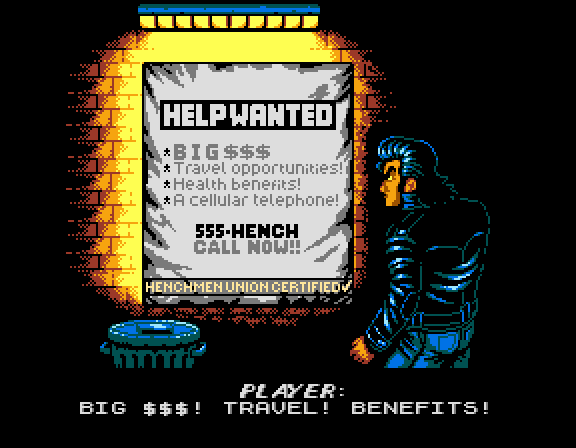New Retro City Rampage trailer has rockets and flamethrowers
Wow, just wow is all one says after watching this trailer for Retro City Rampage, the upcoming summer retro sandbox extravaganza on XBLA. The trailer shows off the Demo …
Read More
Retro City Rampage merchandise goes up on Fangamer
While Retro City Rampage hasn’t hit the XBLA scene quite yet, developer VBlank Entertainment has stepped up and has provided yet another way for fans to appreciate their upcoming …
Read More
Official poster for Retro City Rampage released
Vblank Entertainment, the developer of Retro City Rampage, an 8-bit fusion of classic video game genres, has released RCR’s official poster, featuring a collection of characters and items from …
Read More
Brawler Week: Retro City Rampage Hands On Preview
One of the beauties of being an indie studio is the ability to experiment; there is a freedom to development as there are no true limitations. The game can become a total fan service to the developers themselves. Brian Provinciano of VBlank Entertainment took the time to sit down with us recently and discuss this very fact. His title Retro City Rampage is a culmination of various pop culture references and game design mash-ups that merge into a totally unique game. We were given the opportunity to test it out and loved what we saw.
For the uninitiated, Retro City Rampage parodies the open-world action genre combining dozens of game mechanics into an 8-bit game. The game has a beautiful sense of humor, lampooning an entire era of movies, games and pop culture. Players take on the role of THE PLAYER, an anti-hero, who signs up as a henchman for a local crime syndicate. But things go chronically awry and he must soon defeat the EVIL GOOD GUYS, who will stop at nothing to end his RAMPAGE OF DOOM.
Mr. Destructoid playable in Retro City Rampage
Destructoid had their 5th birthday today (Happy B-Day Dtoid!) and it was announced today that the lovable awesome robot is in Retro City Rampage. Players will be able to …
Read More
Retro City Rampage gameplay shows off tank…rampage
The folks over at GameTrailers are grabbing a load of gameplay footage from games on the show floor at GDC. One such video shows off the destructive …
Read More
Newsbits: Retro City savings, DuckTales re-release, dashboard redesign
- The parody of a parody of everything you love about ’80s and ’90s culture, Retro City Rampage, has shaved a few dollars off its Xbox Live Arcade price …
Read More
A Pixel Story review: The Past is New Again
A Pixel Story sees the protagonist take a journey to the core of The System as he tries to stop an evil OS from destroying everything in existence. The story travels through six …
Read More
Opinion: Microsoft took back the indie crown from Sony at E3, and no one noticed
If you read XBLA Fans with any regularity — or even any irregularity, for that matter — then you’ve probably noticed something about us: we cover indie games. A lot. …
Read More
Lionhead Studios on Microsoft’s Xbox One Indie publishing policy
Yesterday, in an interview with Official Xbox Magazine, Lionhead Studios’ Creative Director, Gary Carr, spoke of Microsoft’s commitment to courting indie developers on the Xbox One. He describes Microsoft as “very passionate” about building strong relationships with Indies, noting that the gaming business’ future is in jeopardy without independent developers.
Gary adds that while the big players like Sony, Microsoft, and Amazon “kind of hold it all together,” independent development is a major force behind innovation, and both big and small players alike can co-exist. Carr’s comments regarding an upcoming presentation from Phil Harrison could be interpreted as a hint that Microsoft may be re-evaluating its approach to publishing on Xbox One.
In a separate interview, Phil Spencer also discussed some of the challenges faced by both the Xbox 360 and Xbox One with regards to game publishing. The ease of development and publishing for the Xbox 360 has been both a blessing and a curse for the console. There have been some immensely high-profile, high-quality releases from a number of independent developers, but much of the Indie marketplace has also transformed into a dumping ground for woefully mediocre titles and clones of clones of clones.
At this point, so far into the console’s lifecycle, it can be difficult to reliably identify Indie games worth playing, and this has led to a significant shift in Microsoft’s publishing strategy for the Xbox One. Thankfully, Phil Spencer is aware of the parallels to Apple’s heavily-curated, closed ecosystem, and addresses them to an extent.
However, the goals are still potentially antithetical to each other; in order to attract good developers who create great content, a market cannot or should not heavily restrict access to its publishing tools. Conversely, a completely open market, where everyone can publish nearly anything, can also lead to a weakened content ecosystem, suffering from the same quality bloat seen in the Xbox 360’s Indie marketplace.


